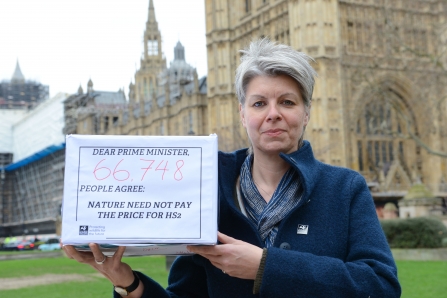The Wildlife Trusts’ report on the environmental damage that HS2 will cause shows that huge swathes of irreplaceable natural habitat and precious wildlife sites will be destroyed. All of our attention must now turn to mitigating the inevitable damage HS2 will cause and try to save as many habitats and species as possible.
The Government and HS2 must reassess the approach they have taken to date and ensure that the impact on the natural environment is fully assessed and plans drastically changed to deliver a net gain for nature.
Matthew Stanton, Head of Planning, Policy and Advocacy at Berkshire, Buckinghamshire and Oxfordshire Wildlife Trust (BBOWT) said: “Now that HS2 has been given the go ahead by the prime minister, it must incorporate a greener vision and deliver biodiversity net gain.
"At a time when 41% of wildlife species are in decline across the UK, we are asking Boris Johnson to stop and rethink.
“As currently planned, HS2 will be bad for wildlife, bad for the environment and destroy precious, irreplaceable habitats.
“Over the last few years BBOWT has met with politicians, HS2 representatives and their key contractors to set out the devastating effect on wildlife the project would have. However, works have continued with scant regard for the environment. In early December 2019, HS2 undertook clearance works at our Calvert Jubilee nature reserve in Buckinghamshire without advance warning.
“HS2 will destroy or significantly impact 108 irreplaceable ancient woodlands, which have been around since the 1600s, 33 Sites of Special Scientific Interest, 693 Local Wildlife Sites and 21 Local Nature Reserves, among other precious habitats.
“A flagship infrastructure project must demonstrate an exemplary regard for the environment. The Wildlife Trusts’ Greener Vision is not just to prevent further declines in species and habitats, but to restore our natural environment. Our vision is a 1km ribbon of wildlife-rich landscape either side of the line where recreated and naturally regenerated habitats would buffer, link and provide ‘stepping stones’ between wildlife sites. Funding for ongoing maintenance would be part of the HS2 legacy.”

